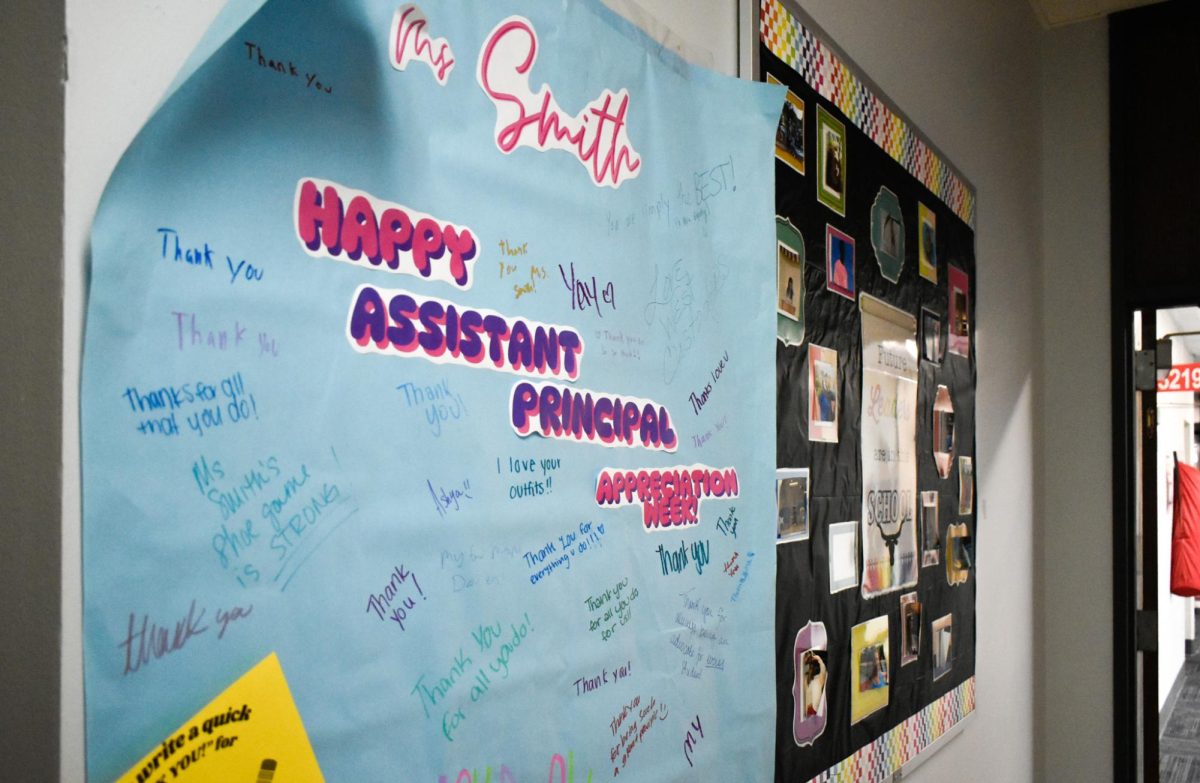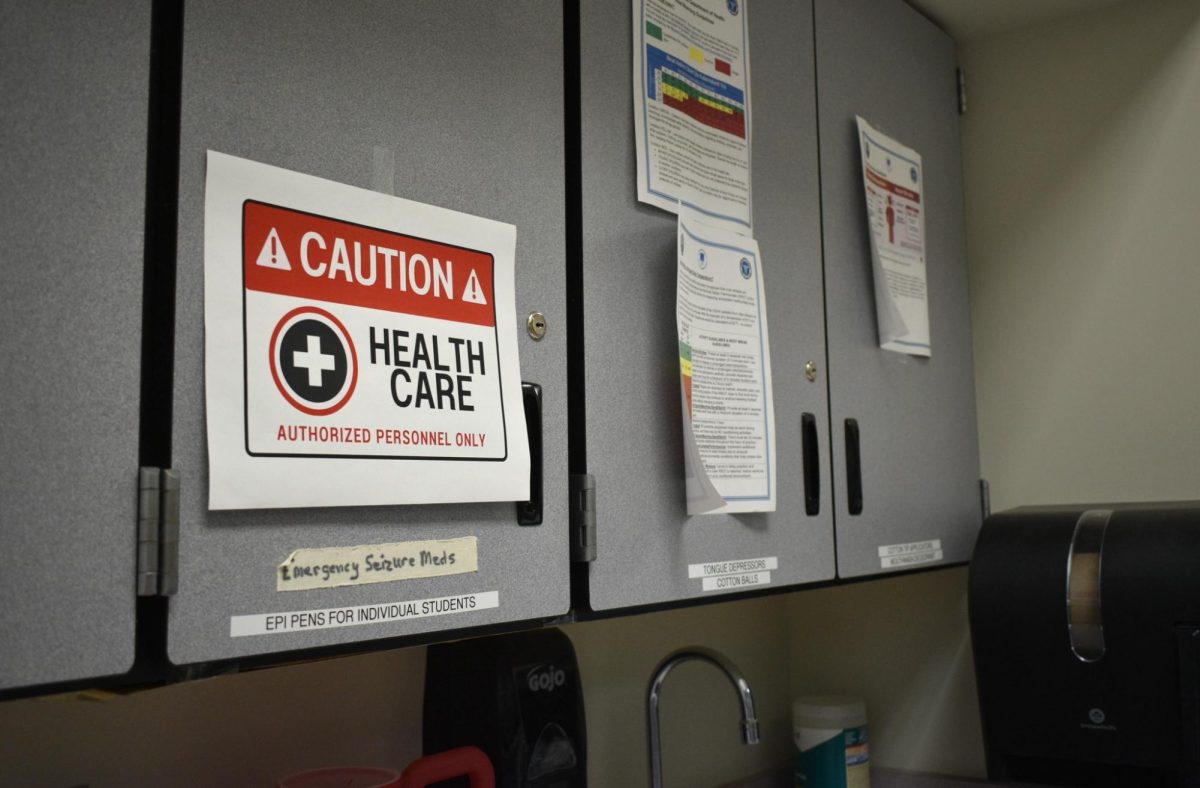West has a history of academic excellence ‚Äî¬Ýa fact that is well-known and often appreciated by students. Ranked fourth out of all public high schools in Missouri, West consistently scores above the state average on numerous EOC standardized tests. As a whole, students at West are widely recognized for their academic success.
Though the academic bar is already high at West, it continues to rise each year with new accomplishments. In March, eight West seniors were named finalists for the National Merit Scholarship, awarded to students with exceptional academic performance. Additionally, every year, select individuals attain the highly coveted and challenging perfect ACT score of 36. The achievements of West students were put into even sharper light at the Honors Ceremony on May 15, when dozens of talented students were recognized for their accomplishments.¬Ý
The academic prosperity of West has progressed to the point that many families compete to join the West community. In fact, in November 2021, Parkway approved a boundary change to address the overcrowding issue at West. As a result of the decision, all Pierremont students now go to South Middle instead of West Middle.¬Ý
From the outside, it‚Äôs easy to look at West‚Äôs status with awe and praise; however, internally, the many decorative achievements of West are a heavy burden for students to carry. The pattern of academic success has created high expectations. No longer are straight As, high scores on tests and acceptance into top colleges viewed as special or out of the ordinary. Instead, what should be considered outstanding and remarkable feats are now viewed as the norm, the average, the ‚Äúobligation.‚Äù¬Ý
In order to meet these expectations, students feel pressured to do more. These types of pressures come from a variety of places: parents, peers or even the students themselves. However, parental pressures are especially prevalent from a young age at West, where most families have a higher socioeconomic status. Consequently, parents expect their children to follow in their footsteps and attain the same, or even greater, amount of economic success.
‚ÄúCompared to other districts in St. Louis, we have fewer first [generation] kids, which reflects that [students are] coming from a household where parents and the grandparents went to college,‚Äù college counselor Chris Lorenz said. ‚ÄúThere’s an expectation for a lot of kids that [they‚Äôre] going to go to four years of high school and then some level of higher [education] from their parents. With that kind of mentality at an early age, parents are pushing their kids to excel [and] there’s a drive [for students] to [do] more [in school].‚Äù¬Ý
In addition to most West parents being educated, a defining characteristic of West families is that most are part of the upper or upper middle classes. The median household income at West is around $137,000 compared to the national average of $75,000. Oftentimes, these parents attained their current stability and wealth through their own hard work and effort in school, and are no stranger to pouring out their time and energy again and again until success is found. Growing up surrounded by this experience lends students to belief in meritocracy, the idea that people attain status and rewards through their own abilities, talents and hard work. Many parents push this mindset onto their children, believing in the necessity of sacrifice in order to succeed and find stability in their future.¬Ý
This stability is often cemented in attaining good grades and building a ‘perfect’ resume. 2024 graduate and West alumna Serena Liu was accepted into Harvard University, a college often seen as the pinnacle of education. Liu has experienced the academic pressures at West firsthand.
“We have a community where both the teachers and parents expect a lot from students, and that drives up the competition. There’s a lot of pressure to succeed both in the classroom and in extracurricular clubs in order to compete for college admissions, especially for high-level schools,” Liu said.
Another key characteristic of the upper and upper-middle classes is that families can afford resources and opportunities that others can’t. While this may seem positive, these resources add a larger burden on students to excel academically, which can easily be represented in the current state of college admissions.
Recently, the already ruthless college admissions process has become even more cutthroat. Over time, there‚Äôs been a significant drop in acceptance rates of top colleges. Across the top 51 colleges, the average acceptance rate dropped 13.3% from 2006 to 2018. Likewise, at America‚Äôs top 10 schools, the acceptance rates dropped from 16% in 2006 to an alarming 6.4% in 2018, even as colleges continue to admit the same number of students each year. The simple truth is that the number of college applicants are growing each year, while the same number of students are being accepted. As the applicants compete with each other to catch the eye of colleges, they strive to fill their resumes with more qualifications. It isn‚Äôt the colleges who are changing the admissions system; instead, it‚Äôs the applicants themselves who are creating an even more competitive environment for each other.¬Ý
‚ÄúThe pool is becoming more competitive,‚Äù Lorenz said. ‚ÄúThere’s more [resources] out there for students to lean on to get help and make stronger applications [with improved] grades or standardized test scores. GPAs, historically, are getting higher across the board [and] there’s a pool of stronger ACT and SAT scores.‚Äù¬Ý
The challenges college applicants face are emphasized in the struggle our students experience daily. As students who share similar attitudes of endless overexertion come together, a culture of perfectionism is created. Similar to the ‚Äúhustle culture‚Äù common in the corporate world, high schools have a ‚Äúgrind culture‚Äù that sets sky-high standards for students.¬Ý
Much of this toxic culture is built from peers as they compete to meet ‚Äí‚Äí and exceed ‚Äí‚Äí the academic rigor displayed by others. Whether it be high GPAs, perfect test scores or rigorous extracurriculars, knowing that someone else has already accomplished something proves to students that it is possible and can create pressure to obtain a similar academic achievement. Similarly, past graduates set a precedent for current high school students as they continue to be accepted into top colleges.
‚ÄúBecause we do send off a percentage of our students every year to highly selective colleges, it’s not unheard of that these pathways exist here at West,‚Äù Lorenz said. ‚ÄúStudents are aware of that and they’re attempting to fill their academic profile with rigor in preparation for what might be their future plan.‚Äù
At West, the graduation rate is an astonishing 97% compared to 79% nationally. Across the nation, only 61.4% of high school graduates go to college, while at West, an average of 89% of students will go on to pursue further education in the form of college or vocational programs. Attending a school where the unspoken rule is to graduate high school and attend college afterwards, students unintentionally pressure each other to do more.
‚ÄúSometimes students have a peer group of friends that are taking [a certain] number of APs and honors [courses] and there’s a peer pressure to stay competitive amongst their friend group. They choose to take more classes to stay in the same arena as their peers,‚Äù Lorenz said.
The main problem at West isn‚Äôt about comparing and competing with individual students though. Rather, the problem is much worse. It‚Äôs no longer ‚Äòwhy can‚Äôt you be more like her?’ or ‘I heard he‚Äôs doing‚Ķ’; Instead, it‚Äôs become, ‘everyone does‚Ķ’ and ‘I should do‚Ķ like everyone else.’
The academic pressures at our school aren‚Äôt about what a select few individuals are doing, but about what the ‚Äòmajority‚Äô is doing. No longer are students competing against a specific student‚Äôs success; the students are fighting the demographic as a whole. When most students are taking harder classes, joining numerous clubs and receiving various awards, it seems like the expected choice to join them. Slowly, we‚Äôve grown accustomed to the competitive culture and began to expect it of ourselves.¬Ý
With this unrealistic standard in place, the high school experience starts to morph into an endless pattern of exhaustion. We‚Äôll spend hours studying and call it normal. We‚Äôll prioritize our academics over relaxing or having fun. We‚Äôll force ourselves to take on more APs and honors courses despite our jam-packed schedules. We‚Äôll continue to drain ourselves more and more just for the sake of the perceived ‚Äònormal.‚Äô¬Ý
As finals come up, students are even more devoted and focused on their academics. Even with the energy and time poured into school, students continue to feel as if they aren’t doing ‘enough.’ It doesn’t matter if you have the most rigorous and prestigious accomplishments when your peers all have similar achievements. Sheltered in a school community where everyone is highly accomplished, the individual successes of students are often forgotten and underappreciated. When this happens, it is easy to view oneself as a failure. Rather than seeing the absurd academic burdens for what they are, many of us, unfortunately, believe we must meet the impossible standards. When we fail to do so, we’re driven by guilt and shame.
This is not the way high school is meant to be. It’s not normal to constantly live in stress, pushing ourselves to be perfect. We shouldn’t continue to set these impossibly high standards for ourselves and each other. Rather, we should acknowledge each and every small achievement and call it what it is: wonderful and remarkable. We need to stop carrying the obligation to exceed expectations repeatedly. As high schoolers, our primary responsibility and duty shouldn’t lie within academic success. Instead, our only obligation to ourselves, each other and our school should be to honor our mission: take care of yourself, take care of each other and take care of this place.

![Like many students, sophomore Medina Nanic experiences pressure to do well in school. Through continuous success and achievements, West has developed a high academic standard for students. “Because we’re seen as one [of] the better schools, we have higher standards than the [schools] who aren’t ranked as high. There’s a lot of pressure on students to do [well] and live up to those standards,” Nanic said.](https://pwestpathfinder.com/wp-content/uploads/2024/05/DSC_0029-2-1200x800.jpg)
![Dressed up as the varsity girls’ tennis coach Katelyn Arenos, senior Kate Johnson and junior Mireya David hand out candy at West High’s annual trunk or treat event. This year, the trunk or treat was moved inside as a result of adverse weather. “As a senior, I care less about Halloween now. Teachers will bring their kids and families [to West’s Trunk or Treat], but there were fewer [this year] because they just thought it was canceled [due to the] rain. [With] Halloween, I think you care less the older you get,” Johnson said.](https://pwestpathfinder.com/wp-content/uploads/2025/10/DSC00892-1-1200x800.jpg)
![Leaning on the podium, superintendent Melissa Schneider speaks to Parkway journalism students during a press conference. Schneider joined Parkway in July after working in the Thompson School District in Colorado. “My plan [to bond with students] is to get things on my calendar as much as possible. For example, being in [classes] is very special to me. I am trying to be opportunistic [meeting] kids [and] being in [the school] buildings. I have all the sports schedules and the fine arts schedules on my calendar, so that when I'm available, I can get to them,” Schneider said.](https://pwestpathfinder.com/wp-content/uploads/2025/09/IMG_5425-1200x943.jpeg)


![Red, white and blue, the American flag holds the values of our democracy. The fight that we once endured has returned, as student journalists and senior correspondents across the country are losing their voices due to government control. “[Are] the White House and [the] government limiting free speech [and] freedom of the press? Yes [they are],” chief communications officer of the Parkway School District and former journalist Elisa Tomich said.](https://pwestpathfinder.com/wp-content/uploads/2025/03/Untitled-design-14.jpg)
![A board in the Parkway West counseling department displays pennants of selective universities. With a wide range of students interested in attending, it’s important that these schools have clear priorities when deciding who to admit. “[Washington University] had the major that I wanted, psychology, philosophy, neuroscience. That's a holistic study of the brain, and [WashU is] the only college in the world that offers that. That's the main reason I wanted to go; I got into that program,” senior Dima Layth said.](https://pwestpathfinder.com/wp-content/uploads/2025/02/Flag-1.png)

![Within the U.S., the busiest shopping period of the year is Cyber Week, the time from Thanksgiving through Black Friday and Cyber Monday. This year, shoppers spent $13.3 billion on Cyber Monday, which is a 7.3% year-over-year increase from 2023. “When I was younger, I would always be out with my mom getting Christmas gifts or just shopping in general. Now, as she has gotten older, I've noticed [that almost] every day, I'll open the front door and there's three packages that my mom has ordered. Part of that is she just doesn't always have the time to go to a store for 30 minutes to an hour, but the other part is when she gets bored, she has easy access to [shopping],” junior Grace Garetson said.](https://pwestpathfinder.com/wp-content/uploads/2024/12/DSC_0249.JPG-1200x801.jpg)

![Senior Sally Peters stands in the history hallway, contemplating her choices in the 2024 United States and Missouri elections on Nov. 5. As a member of Diplomacy Club, Peters has discussed key candidates and issues in contemporary American politics. “[As students], we're starting to become adults. We're realizing how much the policies that are enforced and the laws that make it through the House and Senate are starting to affect us. [Opportunities such as] AP [U.S.Government] and Diplomacy Club [make elections feel] a lot more real,” Diplomacy Club vice president and senior Nidhisha Pejathaya said.](https://pwestpathfinder.com/wp-content/uploads/2024/10/Flag-1-1.png)

Ruthvi Tadakamalla • May 14, 2025 at 10:35 pm
Awesome infographic!
Serena • May 24, 2024 at 7:02 pm
This covers such an important topic and is so well written!
Alisha • May 24, 2024 at 6:38 pm
This is such a good article, and it covers so many issues students at West are definitely feeling!
Yein ate again
Will Gonsior • May 24, 2024 at 10:25 am
an editorial this good
me personally
i think
we like that